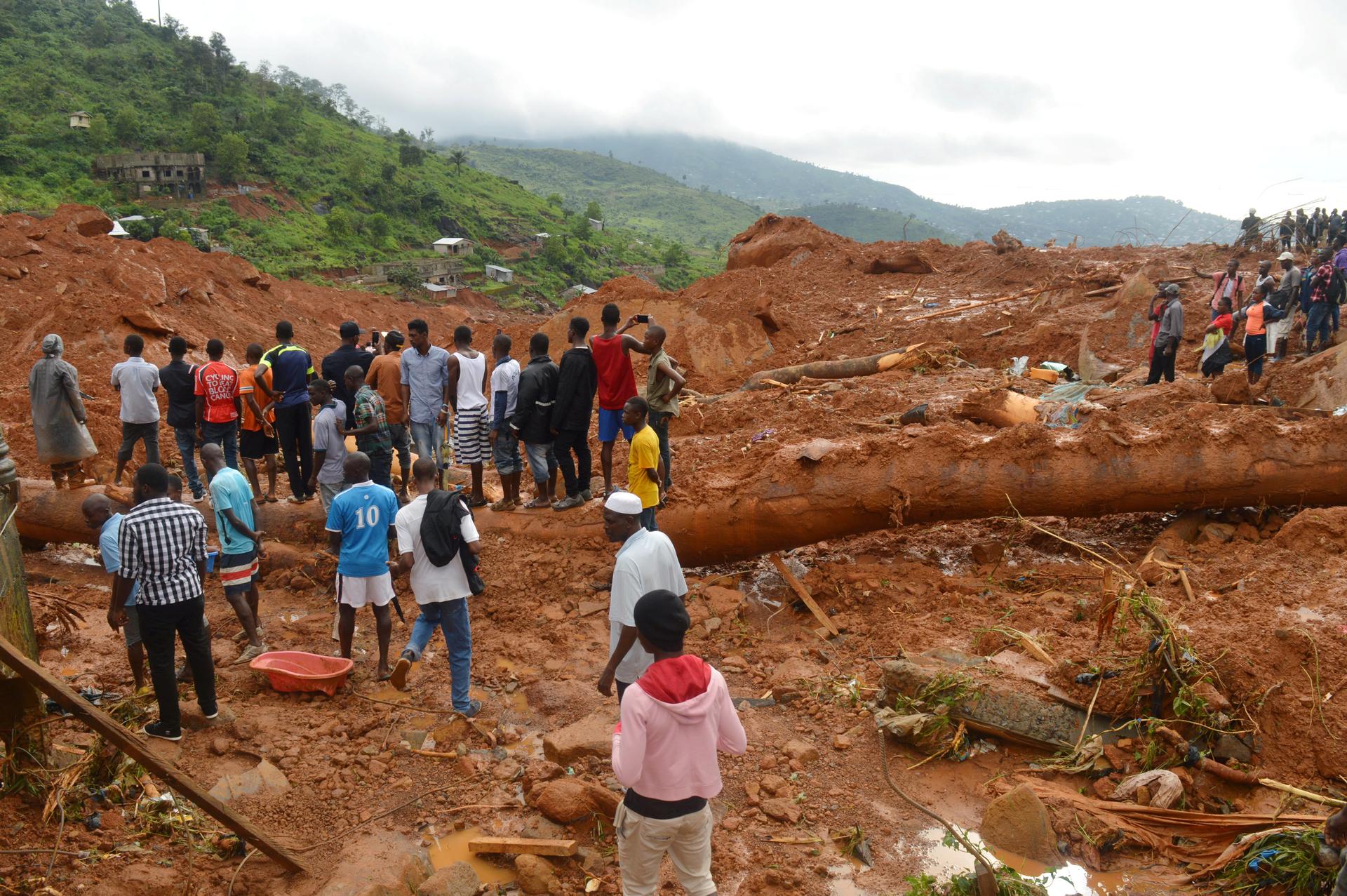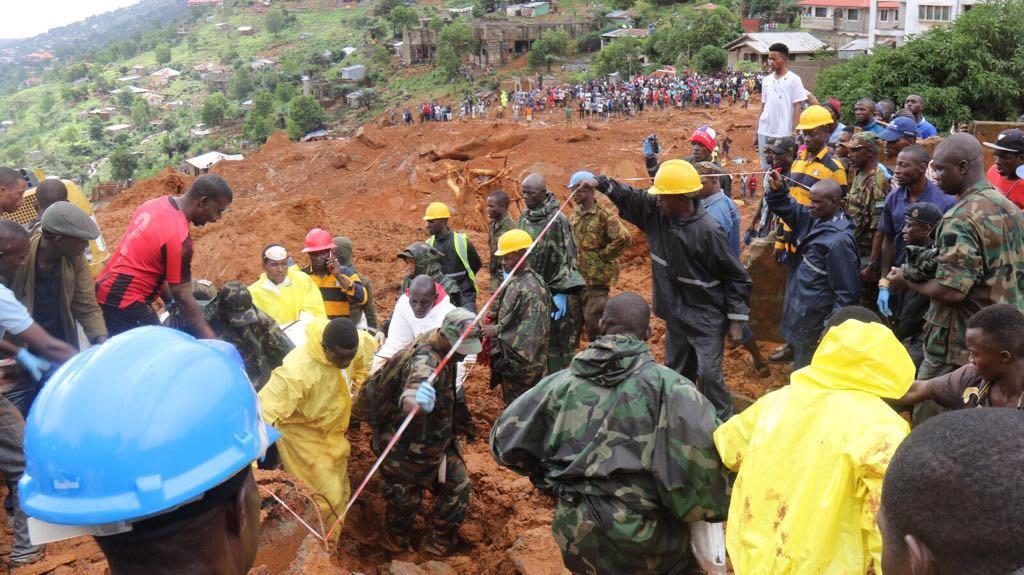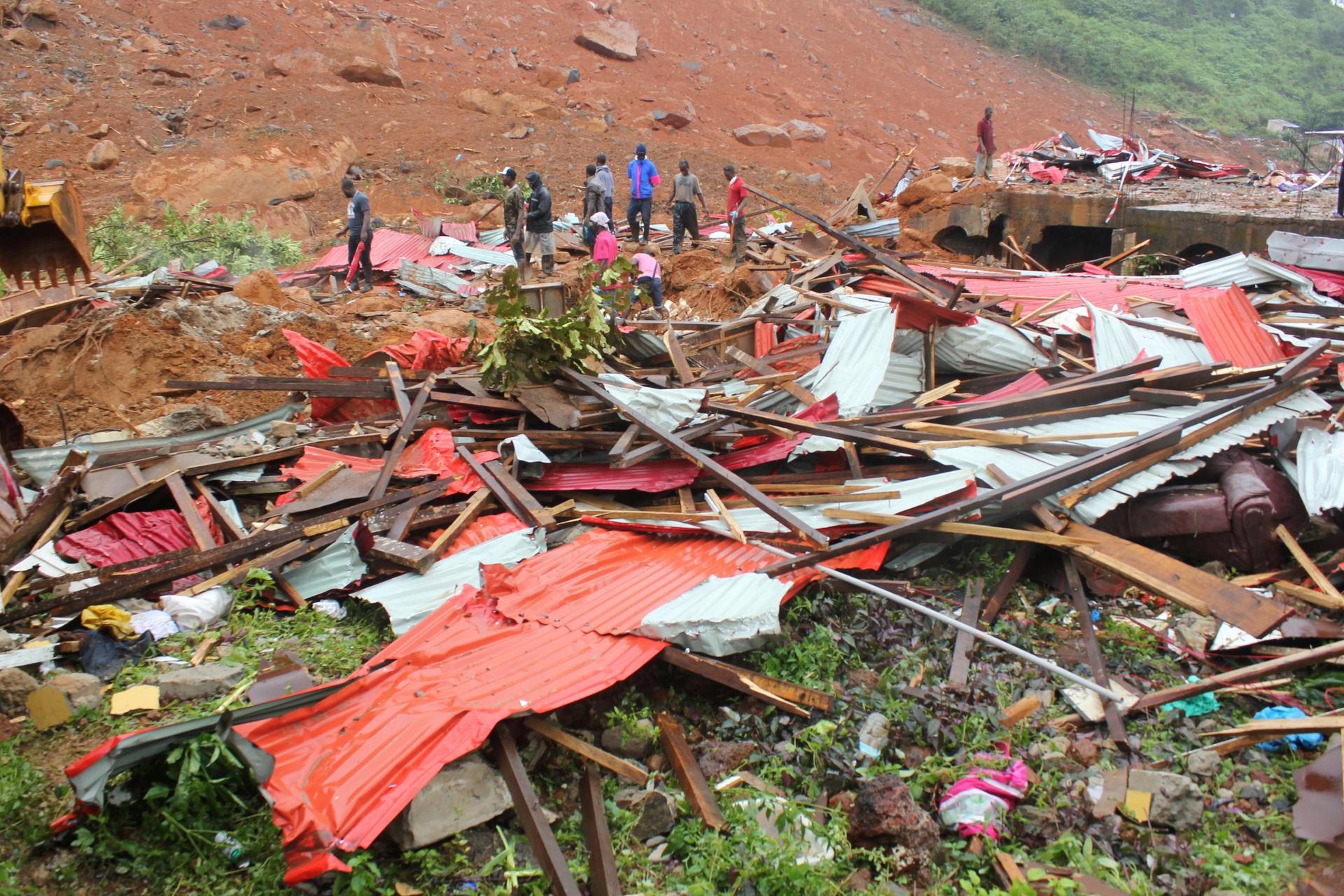Sierra Leone reaches out to international community after hundreds die in mudslides
People inspect the damage after a mudslide in the mountain town of Regent, Sierra Leone.
Sierra Leone's president appealed Tuesday for urgent help for the flood-hit capital of Freetown, where more than 300 people are feared dead, as rescue workers continued a grim search for bodies after one of the worst natural disasters to hit the country.
The Red Cross said it was struggling to excavate families buried deep in the mud that engulfed their homes, though several bodies were pulled up by machines in the devastated hilltop community of Regent on Tuesday, according to an AFP journalist at the scene.
Addressing the media in Regent, one of the areas hit hardest by the flooding, President Ernest Bai Koroma fought back tears as he said the devastation "was overwhelming us."
"Entire communities have been wiped out," Koroma said at the disaster site, where heavy rains streaming down the hill caused a landslide and engulfed homes three or four stories high on Monday, many of them built illegally.
"We need urgent support now," he added.
The government has promised relief to the more than 3,000 people left homeless, opening an emergency response center in Regent and four registration centers, while the Red Cross said 600 people were still missing, though the Interior Minister put the number in the thousands.
Israel and Britain said they were sending aid as quickly as possible to the stricken west African city of about one million people.
Red Cross spokesman Patrick Massaquoi told AFP on Monday that the death toll was 312, but another Red Cross official, Abu Bakarr Tarrawallie, put the death toll at 245 in an email to AFP on Tuesday, while local media and officials all gave different tolls.
"We are racing against time, more flooding and the risk of disease to help these affected communities survive and cope with their loss," Tarrawallie said.

'Sprawling shacks all gone'
At the Regent site, residents told AFP that boulders and rocks had killed many as they rolled onto homes in the early hours of Monday, while a hill partially collapsed as floodwaters streamed down the slopes.
One resident, Abubakar Mansaray, said it took just two minutes for the mudslide to suffocate families in the darkness.
"Many unfinished buildings were at the hilltop, with those sprawling shacks all gone," he told AFP.
Survivors required immediate shelter, medical and food assistance, and dozens of injured people were receiving treatment, the Red Cross's Tarawallie said.
Abibatu Kamara, a mother of three who spent the night on her neighbors' veranda, said the government response so far had been absent.
"We have not received any food or blankets since the disaster occurred yesterday," she told AFP.
Stagnant water
Three days of torrential rain culminated on Monday in the Regent mudslide and massive flooding elsewhere in the city, one of the world's wettest urban areas.
Makeshift settlements that clung to the hills and shores were swept away or torn apart.
The city's drainage system was quickly overwhelmed, leaving stagnant water pooling in some areas while creating dangerous churning waterways down steep streets.
Society 4 Climate Change Communication (S4CCC), a local environment group, called the tragedy a "wake up call."
"Man-made activity meets climate-change head on, a predictable event now made tragically real," the group said in a widely shared blog post.
Deforestation, a lack of urban planning and the nation's existing vulnerability to climate change had all played their part, they said.
Sierra Leone's meteorological department issued no warning ahead of the torrential rains, which might have allowed for swifter evacuations from the disaster zones.

Foreign donors mobilize
At the city's military hospital, community health officer Wilberforce Mohammed Rogers said he had treated several children with multiple injuries, including a six-month-old baby. Many had lost their parents, Rogers said.
An AFP journalist met victims sleeping in schools, community centers and out in the open, while others squeezed into the homes of relatives.
Foreign governments, meanwhile, began mobilizing aid to Freetown.
Israel's foreign ministry said it would provide "assistance immediately and in every way possible" including clean water, medicines and blankets.
British International Development Secretary Priti Patel said she was "deeply saddened" by the devastation and was working with the government to establish what next steps to take.
Annual ordeal
Freetown is hit each year by flooding during several months of rain, raising the risk of waterborne diseases such as cholera.
Flooding in the capital in 2015 killed 10 people and left thousands homeless.
Sierra Leone was one of the west African nations hit by an outbreak of the Ebola virus in 2014 that left more than 4,000 people dead in the country, and it has struggled to revive its economy since the crisis.
The country ranked 179th out of 188 countries on the UN Development Program’s 2016 Human Development Index, a basket of data combining life expectancy, education and income and other factors.
